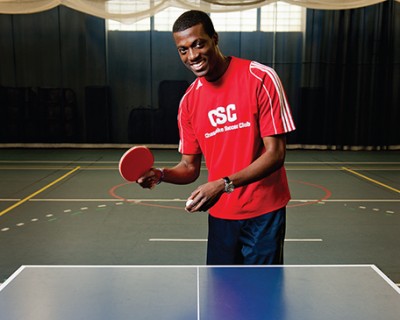Listen to Jai Lawrence ’17 talk about pingpong, and he sounds like a Jedi master of the ball and paddle. “Pingpong requires more mental energy than physical energy,” he says. “You have to predict where the ball will go.” Lawrence first learned the ways of table tennis at 13, when his father made him an unusual proposal—if Lawrence could beat him at pingpong, he would buy him a laptop.
At the time, this seemed unlikely. “I wasn’t good at pingpong,” Lawrence admits. But sitting on the floor of his room, he worked at the game. For hours at a time, he paddled a ball off the wall. Ultimately, his father didn’t stand a chance, and Lawrence won a laptop.
Lawrence is one of the cast of characters in the pingpong club. A mix of Babson and Olin College students united in their appreciation for the little white ball, they gather Sunday nights and fill Webster Center’s lobby with the sounds of the game, a constant rhythm of taps and pings. For Ryan Louie ’17, an Olin student, those sounds remind him of childhood and take him away from the pressures of the everyday. “The sound represents freedom and happiness to me,” he says.

Photo: Webb Chappell
Rotimi Lademo ‘15
Rotimi Lademo ’15 founded the pingpong club in 2012 thinking it would be fun. He started playing in high school, drawn to a game he found to be a smaller and less sweaty version of tennis. As president, he arrives first on Sundays to set up two tables and gather the needed balls and paddles. About 10 students regularly show up to play, and Lademo says they’re a mix of serious and casual paddlers. Some play to win, while others play for the simple joy of keeping the ball in motion.
Count Clara Jung ’16 among those who prefer an easy-going rally to a furious match. The native New Zealander had more than her fill of competition when she played pingpong for the youth national team, competing against squads from Australia and the Pacific islands. Jung quit only after a year or two. “I got sick of it,” she says. “I hated caring about who wins and who loses.”
When Lawrence arrives on Sunday nights, he’s not interested in competition either, at least at first. “Let’s just rally,” he tells opponents. “Let me get a feel of the table.” Once he’s warmed up, though, he becomes a table tennis tactician who plays with patience and cunning. “I slow the game,” he says. “I just hit the ball back. Make them make the mistake.”
Olin’s Louie also is skilled with a paddle. In high school, he competed in U.S. Nationals, and his pingpong resume is stellar enough that the USA Table Tennis organization includes him in its national ratings. To improve his game, Louie studies pingpong clips on YouTube and plays at area pingpong clubs. He believes that anyone can become good at the game if he or she works at it. “It’s not basketball, where if you have height you dominate,” he says. “Pingpong is very democratic.”
The pingpong club may offer a nice diversion and a chance to socialize, but it’s more than that to Louie. The Sunday gatherings are about commitment to a game he loves. “I want to play it the rest of my life,” he says.—John Crawford
